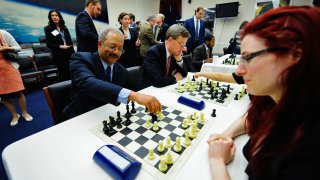
Jennifer Shahade, a two-time U.S. women's chess champion, learned how to play chess from her dad when she was about 5 years old. By 9, she was playing in her first tournament, and by high school, Shahade was traveling the world to play in chess matches.
Today, Shahade, 39, is the women's program director at the U.S. Chess Federation and also a competitive poker player. Since the October debut of Netflix's "The Queen's Gambit," about a fictional woman chess grandmaster, Shahade says interest in chess, especially among women, "has exploded."
(According to Bloomberg, online playing site Chess.com has added around 1 million new members each month since lockdowns began in March, and around 2.8 million in November alone.)
For newbie chess players, Shahade says "deep focus and deep concentration" are the most important skills to develop.
Here's how Shahade preps for a chess match — and her tips can help anyone focus.
Know your peak hours
Over the years, Shahade says she's learned its important to figure out at what time of the day or night you perform best — what she calls your "peak hours" — and do the most taxing work during that time.
Money Report
"It's good to figure out what times of the day you have the most acuity," she says. For instance, if Shahade is developing ideas for a new chess position to use during a competition, "that would be something you really want to do when you're on point."
Find quiet time
Before big games, Shahade likes to be left alone, especially right before the match, to mentally prepare herself. "You drain energy when you are around a lot of people," she says.
After the game, she says she typically hangs out with other players.
Remove distractions
During a competition, chess players are not allowed to bring any devices with them. That's useful, says Shahade, because it removes a common distraction and keeps her attention and concentration on the game.
Exercise
As a chess player, exercising can be important to increase stamina and focus. But Shahad likes to get physical activity after a match, too.
Shahade says she likes to sometimes walk after playing. "I thinking the walking...[is] a way to kind of emulate what your brain just did," she says.
During a chess competition, while your body is not moving for hours, your brain is. "Inside, the moves are racing furiously through your brain. So it kind of leaves you in this weird state afterwards, where you're tired but your body didn't really move a lot. So it needs to move to play catch up with the brain in a way."
Don't miss:
Stanford scientist: 12 tiny habits that will instantly make you more productive
Four-time memory champion: 3 things you should do every day to improve your memory






